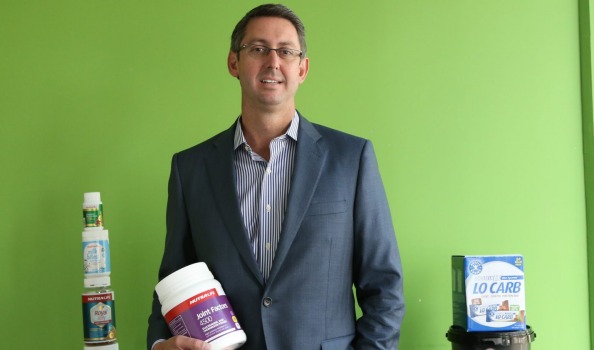BlackMores
The four or five biggest “daigou” shoppers who buy vast volumes of Australian vitamins and then ship them into China for sale are still holding too much stock at the end of August, meaning it will take some time for volumes to pick up again for the big vitamin firms like Blackmores.

Vitaco chief executive Ryan D’Almeida says the four or five biggest Chinese vitamin traders are still holding excess inventory.
Louise Kennerley
Ryan D’Almeida, chief executive of Vitaco, which makes brands including Healtheries, Wagner and Nutra-Life, said on Tuesday that his company had succumbed to similar forces as bigger rival Blackmores, with Vitaco sales in the first three months of 2016-17 expected to be lower than the same time a year ago.
This follows regulatory uncertainty in China which has slowed the pace of e-commerce sales in China for Australian vitamin brands.
What started out as a “suitcase trade” for entrepreneurs in Australia buying up large amounts of vitamins has evolved into huge businesses with turnover for some of the entrepreneurs now in the tens of millions.They buy from Blackmores, Swisse, Vitaco and others.
“They’ve got a lot of their cash tied up,” he said on Tuesday after Vitaco announced its maiden full-year results.
Vitaco on August 4 received a $314 million agreed takeover offer from Chinese company Shanghai Pharmaceuticals and Chinese private equity group Primavera Capital at $2.25 per share, and he said on Tuesday the company was “not aware of any other interest” from rival outside parties. Vitaco shares were largely steady at $2.09 by noon on Tuesday.
Regulatory uncertainty
Mr D’Almeida said the business had met prospectus forecasts for revenues and net profit after tax in 2015-16, but regulatory uncertainty in China which began in April as authorities moved to tighten cross-border e-commerce rules would trigger a sales slowdown in the first quarter of the new financial year. “China softening is contributing the majority of that change”.
Sharemarket darling Blackmores had its share price crunched last week when it revealed that it expected a softer first quarter in financial 2017 because of the knock-on impacts of regulatory uncertainty in China and a de-stocking by big Australian retailers who had bought up in the last quarter of fiscal 2016 in the expectation that soaring demand would continue.
But then they backed off with fresh orders for stock when it became clear that sales were softening into China. Blackmores chief executive Christine Holgate also said last week that “daigou” entrepreneurs had also changed their shopping patterns and were now buying direct from manufacturers. Blackmores shares have tumbled from $160 to $126 over the past few days.
Hefty price tag
Vitaco on Tuesday announced that revenues for 2015-16 were $212.8 million versus the prospectus forecast of $211.3 million. Net profit after tax was $13.1 million, up 3.1 per cent on the prospectus forecast. Sports and nutrition products sales revenue was slightly below the prospectus forecast. Vitaco will pay a final dividend of 2.96¢ per share on September 30.
Shanghai Pharma, which is the 60 per cent partner in the bidding vehicle for Vitaco, was an underbidder in the sales process for Swisse Wellness, which was acquired by Chinese firm Biostime International in a deal which valued Swisse at a hefty price tag of $1.67 billion.
Swisse has an aggressive marketing budget which uses actors and sports stars such as Nicole Kidman, Ricky Ponting and Lleyton Hewitt to promote its products. Blackmores uses retired Chinese tennis star Li Na as an ambassador in China, but Vitaco has a more low-key approach, with sales of its brands in China at a much lower level.
by Simon Evans
